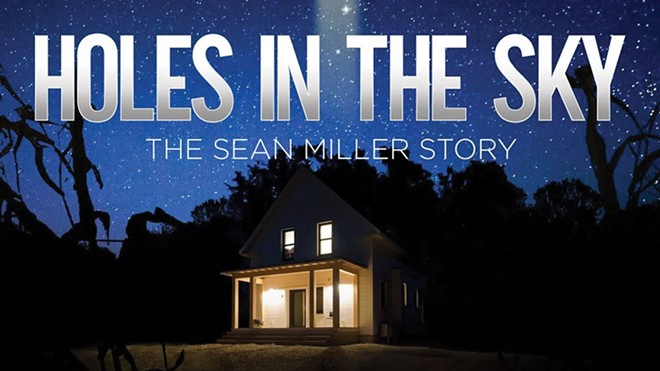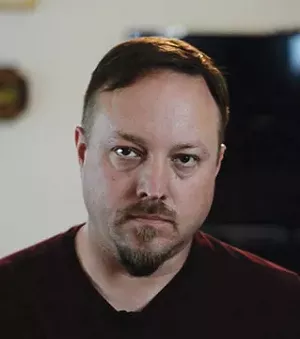Central Illinois filmmaker Ash Hamilton had written a script and was ready to begin shooting in 2020 when everything was turned upside down by the pandemic. He realized that his plans needed to be altered, and he had to learn how to pivot.
“With the script I had written, complications occurred and basically, my idea imploded,” said the filmmaker, who resides in Loami. Realizing that any project he might undertake during the lockdown era would have to be more manageable, he came up with a new idea, and ventured into a genre many independent filmmakers have utilized for his first feature-length film.
“I needed something small and controllable, and horror films have always been in my wheelhouse,” Hamilton related.
The result was Holes in the Sky: The Sean Miller Story, a smart, slickly produced genre exercise that uses the conventions of the “found footage” films to create an incredibly personal and poignant character study. The titular character disappears for four days in 2013 and turns up over 100 miles away from home. Seven years later, he reluctantly agrees to discuss what happened with a curious filmmaker (played by Hamilton) and his wife (played by the filmmaker’s wife, Chanell Hamilton).
Shot over the course of three months with another two-and-a-half months devoted to editing and post-production, the movie has been racking up an impressive number of awards, 18 in all, after screening at more than 20 film festivals around the world.
Ash Hamilton, a Loami resident, has won multiple awards for his first feature-length film, which was shot in central Illinois using local actors.
With such an impressive track record, it was only a matter of time before it would be picked up for distribution. Deskpop Entertainment will be releasing it via Video-on-Demand services and on DVD on Nov. 1, with additional streaming offerings coming in 2023. However, area viewers do not have to wait that long, as the film will receive a red-carpet screening at Springfield’s Hoogland Center for the Arts on Sept. 30 at 8 p.m.
There’s a sense of realism that’s palpable throughout Holes that ultimately holds it in good stead. Its fly-on-the-wall quality creates a sense of intimacy with the characters and their situations that help make the film’s fantastic turns of events seem more immediate, their impact more powerful.
This genuine quality is no accident as Hamilton used his experience making corporate videos to create the movie’s documentary sensibility, while the amateur cast, whether they realized it or not, contributed to this as well.
“I do a lot of table-top gaming,” Hamilton said, “and with COVID, we had a small circle of friends who would come over to play. There were some professional actors I wanted to work with, but we couldn’t coordinate our schedules. So, my friends who would come to play, I talked to them and before they knew it, they were in the production.”
This catch-as-catch-can approach paid off handsomely. The unaffected approach actor Sean Ed takes as Miller as well as the work by Hamilton and his wife, Chanell, – effectively playing themselves – and Douglas McDonald as their skeptical cameraman, contribute to the you-are-there aesthetic that makes the movie so effective.
It hasn’t been without its perks for the actors. “It’s an interesting spectacle to go to these film festivals and you see recognizable actors and the way they’re treated, and then you’re treated the same way, to a smaller extent,” said Hamilton.
Shot in and around Curran and New Berlin, there’s a sense of isolation to the movie that effectively underscores the suspense. That Hamilton was able to complete Holes locally is significant.
“When you think about movies, people automatically think they’re made on either the West or East Coast,” said Hamilton. “I’m from rural Illinois, and it’s important for me to show that a movie of this caliber can be done here, to show that we can do this locally. If nothing else, maybe some aspiring filmmaker or someone studying film in college will see it and gain some inspiration from it.”
Those hoping to embark on a career in filmmaking would do well to check out Holes. There’s plenty of innovation and inspiration in it to go around.
Source by www.illinoistimes.com
















































